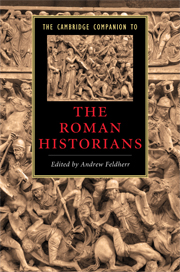Book contents
- Frontmatter
- Introduction
- Part I Approaches
- Part II Contexts and Traditions
- Part III Subjects
- Part IV Modes
- Part V Characters
- Part IV Transformations
- 20 Josephus
- 21 The Roman exempla tradition in imperial Greek historiography: The case of Camillus
- 22 Ammianus Marcellinus: Tacitus’ heir and Gibbon’s guide
- 23 Ancient Roman historians and early modern political theory
- 24 Re-writing history for the early modern stage: Racine’s Roman tragedies
- 25 The Roman historians and twentieth-century approaches to Roman history
- Chronological list of the historians of Rome
- Bibliography
- Index
20 - Josephus
from Part IV - Transformations
Published online by Cambridge University Press: 28 November 2010
- Frontmatter
- Introduction
- Part I Approaches
- Part II Contexts and Traditions
- Part III Subjects
- Part IV Modes
- Part V Characters
- Part IV Transformations
- 20 Josephus
- 21 The Roman exempla tradition in imperial Greek historiography: The case of Camillus
- 22 Ammianus Marcellinus: Tacitus’ heir and Gibbon’s guide
- 23 Ancient Roman historians and early modern political theory
- 24 Re-writing history for the early modern stage: Racine’s Roman tragedies
- 25 The Roman historians and twentieth-century approaches to Roman history
- Chronological list of the historians of Rome
- Bibliography
- Index
Summary
“Classics is the study of the culture, in the widest sense, of any population using Greek and Latin, from the beginning to (say) the Islamic invasions of the seventh century A.D . . . [W]hy have we allowed our “canon” of what is worth reading in Greek and Latin to be narrowed to whatever counts as “literature”? . . . But above all, why do we exclude from the standard conception of what a classical education is about Jewish and Christian texts in Greek, and Christian texts in Latin? . . . If we allowed ourselves this angle of vision on the classical world, we could also accept the centrality of the works of Josephus, written in Greek in Rome in the later first century A.D., but representing to the pagan world a tradition and local history going back to the Creation.” / The field of classics has become broader and more welcoming of scholarly work on Judean and Christian texts since Fergus Millar originally offered these remarks in 1993. His own scholarship and that of other classicists and ancient historians has made it more inviting for those in the field who choose to concentrate on the historiography of Josephus. The study of Josephus' texts can lead to a far richer understanding of the interplay of various cultures in the ancient Mediterranean world in the first century CE. This short introduction will provide an overview of the author and his works, the reception of his texts in conjunction with the problem of defining the modern fields of classics and ancient history, and protreptic examples for readers who might find inspiration for new investigations in the pages of Josephus.
- Type
- Chapter
- Information
- The Cambridge Companion to the Roman Historians , pp. 319 - 331Publisher: Cambridge University PressPrint publication year: 2009
- 4
- Cited by

